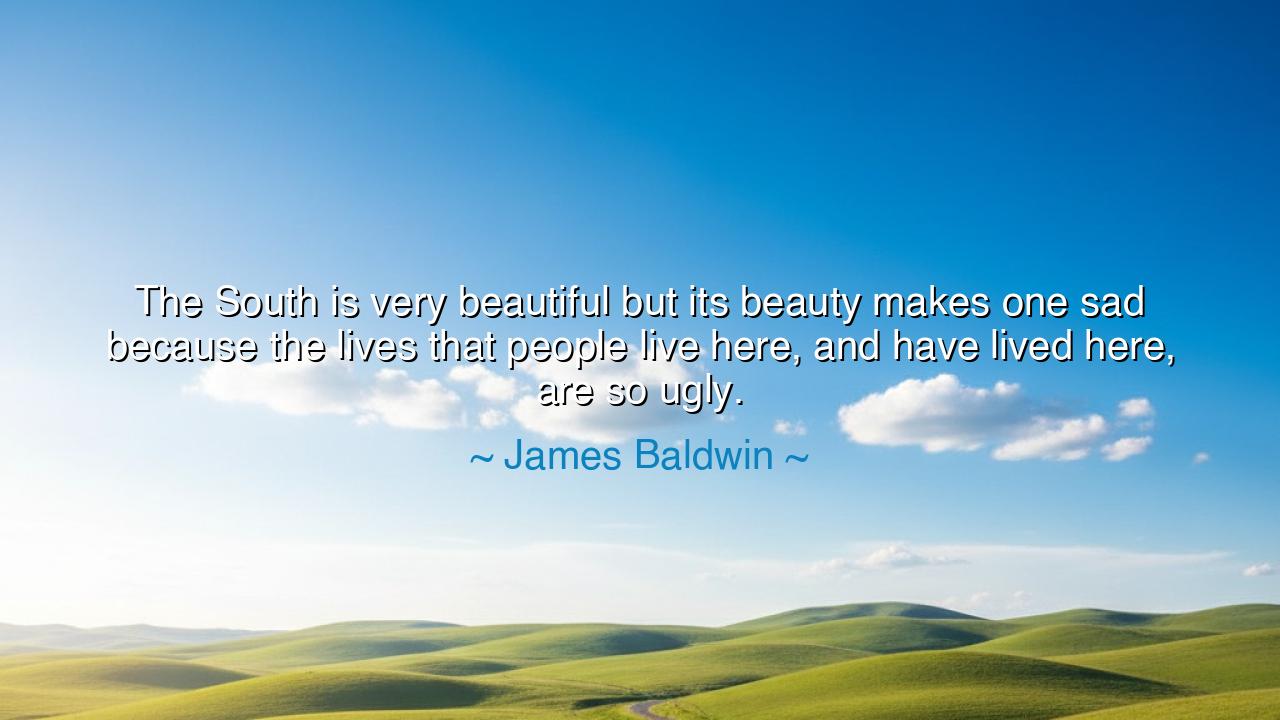
The South is very beautiful but its beauty makes one sad because
The South is very beautiful but its beauty makes one sad because the lives that people live here, and have lived here, are so ugly.






There are landscapes in this world whose beauty feels like a wound. James Baldwin, in his searing insight, once said, “The South is very beautiful but its beauty makes one sad because the lives that people live here, and have lived here, are so ugly.” In these words lies not contradiction but tragedy: that the same sun which blesses the fields of magnolia and cotton also shines upon the scars of injustice and suffering. Baldwin, whose soul walked between two worlds—the world of light and that of darkness—saw that beauty without justice becomes a mirror that reflects what has been lost.
The American South, with its golden plains and haunting stillness, is a place steeped in memory. Baldwin saw it not as a poet romanticizing its charm, but as a prophet lamenting its sorrow. Beneath the songs of cicadas and the whispering pines lay a history soaked in blood—the labor of enslaved people, the chains of segregation, the silence of complicity. Its beauty mocked its pain. The magnolia blossoms, radiant and soft, bloomed upon soil nourished by centuries of grief. Thus Baldwin’s sadness was not for the land, but for what humanity had done upon it.
In this, he echoes the wisdom of the ancients who knew that harmony between nature and man is sacred, and that when man defiles the moral order, even paradise turns bitter. The philosopher Heraclitus once said that the “most beautiful order is a heap of sweepings piled at random.” Baldwin understood this paradox—that even beauty can conceal chaos, that the loveliness of a place cannot redeem the ugliness of the human heart. The South’s rivers may glisten like glass, but they carry reflections of faces once bowed in oppression, once silent in fear.
Consider the story of Harriet Jacobs, who spent seven years hidden in a crawlspace above her grandmother’s home in North Carolina, unable to stand upright, just to escape the lust of her enslaver. Outside her hiding place, the world shimmered with sunlight and song. Inside, she lived in suffocating darkness. Baldwin’s words could have been spoken for her—for the dissonance between the world’s outer beauty and its inner cruelty. It is this very dissonance that pierces the soul of the sensitive, the just, the awakened.
Baldwin’s grief was born from love—a love fierce enough to see clearly. He did not despise the South; he mourned it. He saw that a people trapped in lies about their past can never be free, no matter how beautiful their surroundings. The plantations, the porches, the slow drawl of summer evenings—all these could not cover the deeper truth that many hearts had learned to live comfortably with cruelty. Baldwin’s sadness was the sadness of one who still believed in redemption, who longed for the day when the beauty of the land would finally match the beauty of its people’s lives.
This truth extends beyond the South, beyond America. Every land, every age, carries its own contradiction between appearance and soul. A city gleaming with towers may hide the despair of the poor. A family smiling in photographs may conceal silence and pain. Nature, in its eternal innocence, stands as both witness and accuser. Baldwin calls upon us to look upon our surroundings—not only with admiration, but with conscience. For beauty, when untethered from compassion, becomes a haunting thing.
And so, the lesson is this: Do not be deceived by the loveliness of the world if the hearts within it are chained. Work to make your life, your community, and your nation as beautiful in truth as they are in form. Let justice till the soil where hatred once grew. Let honesty cleanse the rivers that carry the memories of the fallen. Baldwin’s words remind us that real beauty is not found in the landscape—it is found in the dignity of those who live upon it.
When next you behold a place of great beauty, pause and listen to its silence. Ask not only what your eyes see, but what your soul feels. For if sadness lingers there, it may be that the land remembers what the heart of man has forgotten. And it is then, in that act of remembrance, that healing may begin.






AAdministratorAdministrator
Welcome, honored guests. Please leave a comment, we will respond soon